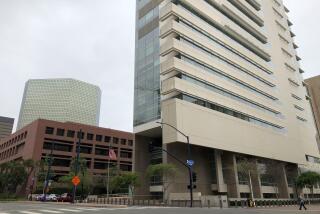U.S. to Seek Slave Case Testimony in Mexico : Crimes: Under prosecutors’ proposal, former employees of Somis rancher Edwin M. Ives would be bused from remote villages to the Mexican capital.
- Share via
Federal prosecutors on Monday will ask to take most of the testimony in the slavery trial of Somis flower rancher Edwin M. Ives in Mexico City so his former employees can be bused from rural Indian villages to testify.
If U.S. District Court Judge Consuelo Marshall grants the request, it will mark the first time that testimony used at an U.S. trial is given primarily in a foreign country, attorneys said.
Assistant U.S. Atty. Carol Gillam has asked Marshall to allow the testimony of 67 people to be taken in the Mexican capital to avoid the cost of flying witnesses to Los Angeles and to encourage them to testify.
“We have no way to compel these people to come up here,” Gillam said in an interview Thursday.
The witnesses are mostly Zapotec and Mixtec Indians who live in villages so rural that Spanish is a second language.
Prosecutors allege that they were smuggled to Ives’ 50-acre Somis compound during the 1980s, forced to work for about $1 per hour and to buy food and sundries at inflated prices from a company store. Ives, 54, six ranch overseers and an alleged smuggler are charged in a 15-count indictment alleging civil rights and labor violations.
In other federal cases, one or two witnesses who have refused to come to this country have been questioned under oath abroad, Gillam said, “but never in these numbers. Of course, there’s never been a case like this, so we’ll be doing a lot of things that have never been done before.”
The Ives prosecution is the most far-reaching slavery case ever filed by the United States, Gillam has said.
Robert M. Talcott, an Ives attorney, said he will oppose the prosecution’s motion on Monday.
Out-of-court testimony “is absolutely unheard of on the scale that’s being proposed here,” he said. “It’s almost a joke. They are doing this because they are trying to hide something.”
Many of the 67 witnesses to be called in Mexico are also listed as defense witnesses, Talcott said. And in interviews with his investigators, they support Ives’ contention that he has done nothing wrong, the lawyer said.
Talcott said the request is an attempt by the government to maintain control over unsophisticated witnesses who could undermine the prosecution’s case.
“We have been told that these are exceedingly naive, impressionable villagers, and everything that has been done by the government appears to ensure that no rays of light will ever reach them,” Talcott said.
He said Mexican government officials, perhaps even Mexican police, will pick up the villagers, transport them to Mexico City and provide them with room and board before they testify.
“It places a chill on their testimony,” and raises questions about their independence, he said. If they lie on the stand, no perjury charges can be brought against them because they will not be within the jurisdiction of a federal court, he said.
Gillam disagreed. She said the witnesses will not be assisted by the Mexican government, but by representatives of the U.S. Embassy in Mexico City.
“There will be no police involved,” she said.
If Judge Marshall consents, federal prosecutors and eight attorneys for Ives and the other defendants will question witnesses in Mexico during November and the first two weeks of December.
Most witnesses will brought in small buses over dirt roads to Mexico City, a journey of about 11 hours in good weather, Gillam said. Their questioning will be videotaped and Marshall will edit inadmissible comments from the tape before it is shown to a jury during the trial, which is scheduled for March.
Talcott said the job of reviewing and editing the tapes places a mind-boggling burden on the judge.
The foreign testimony is also likely to be very expensive.
Talcott has asked the judge to order the prosecution to pay for the defense’s travel and hotel rooms in Mexico City. Defendants also have a right to observe the testimony and could seek reimbursement for travel expenses, he said.
More to Read
Sign up for Essential California
The most important California stories and recommendations in your inbox every morning.
You may occasionally receive promotional content from the Los Angeles Times.












